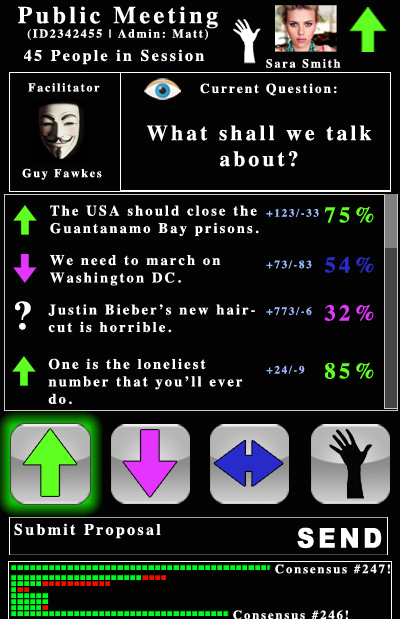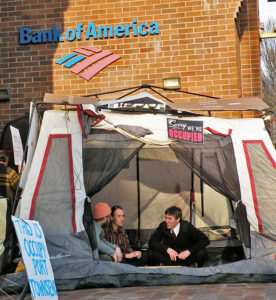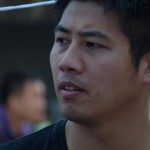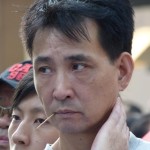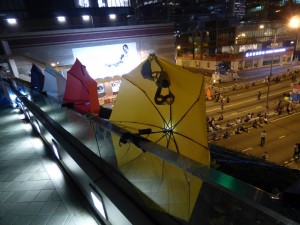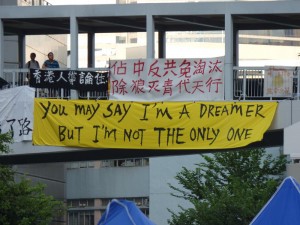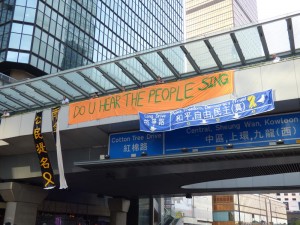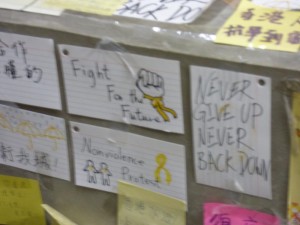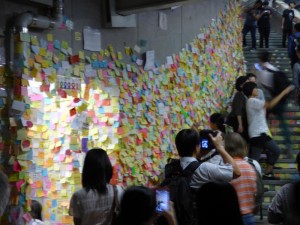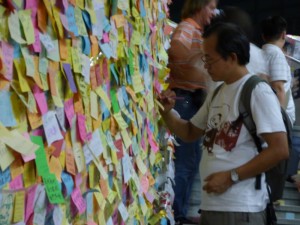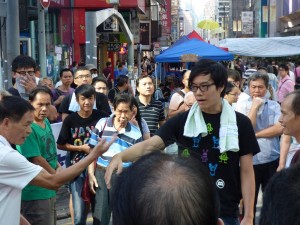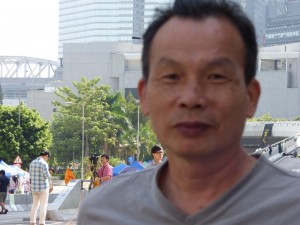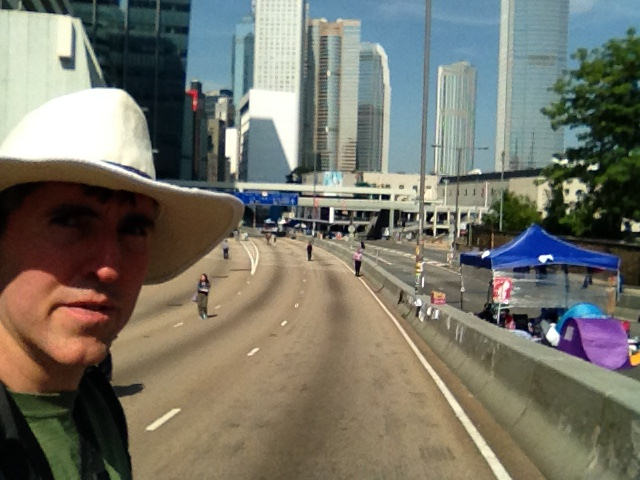Matt Ready: …cause I’m probably not even going to use this. Periscope. Periscope’s a good way to connect with. See? We already had someone one random person on Earth joined [unclear 00:00:16] 007 joined us. Let’s see.
[Matt sings “Everybody Wants to Rule the World” (Tears for Fears) and “Under Pressure” (Queen)]
Matt Ready: I think someone’s phone’s ringing. You’ve got a phone call but [unclear 00:02:20].
Speaker 4: I’ve been getting a lot lately. I think it’s just those collect- not collection but [unclear 00:02:27].
Matt Ready: Live, live, we’re on the air. I should put a note up that says that. Someone could come in the door.
Chris Mason: Where are we going to sit?
Matt Ready: Here.
Chris Mason: Okay. In these two chairs?
Matt Ready: Yeah.
Chris Mason: Okay. You have a preference?
Matt Ready: No.
Chris Mason: Okay. Are you going to interview me?
Matt Ready: I think that’s… Well, what do you think? Interview or just a conversation? I mean, is there a difference? Is there a role difference?
Chris Mason: Sure! You ask the questions.
Matt Ready: What if like I ask three questions, you ask three questions?
Chris Mason: No, I just want to be interviewed.
Matt Ready: Okay. All right. That works.
Chris Mason: So Claire is the camera person?
Matt Ready: Are you ready, Claire?
Claire: I don’t know.
Matt Ready: Okay. So yes, so whatever you point that at — and we’ve got — we’re on a —
Claire: How do you work this [unclear 00:04:07].
Matt Ready: Unscrew. Then do this then it’ll be like…
Claire: Oh, it’s that kind. Okay.
Matt Ready: Yeah. And then I think —
Claire: Yeah.
Matt Ready: And so one is facing at the wall so it’d give us sort of — we’re all behind the camera now and…
Chris Mason: [Unclear 00:04:25].
Matt Ready: Yes. This is where I [unclear 00:04:27] but it’s like on Twitter. It’s Periscope and that’s interesting like international YouTube. You get people from all over the world that just sort of drop in and out constantly and once in a while you can get a few people actually stay in. So Claire can see how many — there’s no one — if people have been dropping in but nobody is sitting there watching. Now there’s one and I think if I click on that — seven [unclear 00:05:03] so that was the total people they had watching it. Anyways, and so you could — I think you can even… Anyways. But basically you just point it at —
Claire: Wait, wait, wait. So what do you want me to do?
Matt Ready: You just point it at us or yourself, if you want to point it at yourself for some reason and talk [unclear 00:05:28]. Yeah. And I don’t know if this is really helping. It’s just a kind of experiment. We could sort of —
Chris Mason: So this is just what Clair can see on the screen [inaudible 00:05:38].
Matt Ready: Yeah. But if I like put it up in a — if I set this up so that we could see that screen, we could actually read chat messages; she wouldn’t have to read them to us. We could actually just watch them.
Chris Mason: Well, I could read it from here [crosstalk] a little bit bigger but —
Matt Ready: We could [scoot] but we can rearrange. We’re in charge of the — well, let’s see here. I can make the — Oh!
[Laughter]
Matt Ready: Camera person down!
[Matt arranges the equipment]
[00:06:06]
Matt Ready: This bigger.
Chris Mason: And we can draw the curtains so it’s a little bit darker.
Matt Ready: All right, so… [Unclear 00:06:40].
Chris Mason: [Unclear 00:06:41] that screen again?
Matt Ready: Yeah, I think I might be able to [unclear 00:06:45]. All right. So now…
Claire: Now what?
Matt Ready: Claire, you are in charge of — you can put that camera on anything in the room.
Claire: Okay. Just like… [Unclear 00:07:04]. So we’re supposed to like film here, right?
Matt Ready: Now, just watch the — you want to be just careful not to pull this cable out. That’ll disrupt things. Let’s maybe… here, you stand there.
Claire: I’m going to go to the other side.
Matt Ready: Yeah. That’s probably a good general area.
Chris Mason: It’s kind of looking down on us. Is that good?
Matt Ready: I don’t think so. Unscrew that and hold this [unclear 00:07:45] go down. All right, so you decide where, height wise.
Chris Mason: If you need us to move, if that’s easier then you moving, just let us know.
Claire: There [unclear 00:08:13].
[00:08:15]
Matt Ready: All right, ready? Ready for action?
Claire: Okay.
Chris Mason: It’s going to be dynamic. Be prepared.
Matt Ready: Okay. Ready? Take one.
[Laughter]
Chris Mason: Of one.
[Laughter]
Matt Ready: Let’s see. So hello there! My name is Matt Ready. I am the host of this webcast, which we’ve been calling The Mindful Activist. We’ve had about 18 episodes. We’ve been in existence for two and a half years. If you go to mattready.net you’ll find out more about me and the things I’ve been doing around this webcast. With me today is my good friend, Christopher Mason.
Chris Mason: Hello.
Matt Ready: We have, as many of you I know are well aware, we’ve been having shows together and broadcasting our talks to the world for several years now.
Chris Mason: I think you’ve been broadcasting them to the world.
Matt Ready: Yes. We’ve been recording them, showing them through various media outlets. Yes. How many times now have we done this?
Chris Mason: Three maybe? Three or four.
Matt Ready: And the first time was on your show.
Chris Mason: Correct.
Matt Ready: And what was — tell us about that show for the few people who have not heard of it.
[Laughter]
Chris Mason: So on that show I appear in my professional persona; I’m a police officer so I’m in uniform typically, and I interview people generally from the community in which I live, which is in Vermont, in Middlebury, Vermont, talking to them about various different things. Usually about what they do, what kind of organization they represent but sometimes it gets a little more esoteric. We talk about their beliefs, their aspirations, their visions of the world.
Matt Ready: And this is called Middlebury 5.0.
Chris Mason: Middlebury 5.0.
Matt Ready: Does it have a website? A massive social media following?
Chris Mason: Television station, which is Middlebury Community Television.
Matt Ready: So it’s like Wayne’s World for the police of Middlebury.
Chris Mason: Yes. I suppose one could describe it thus.
[Laughter]
Matt Ready: Or The View. It’s kind of like The View.
Chris Mason: Only old people are going to know kind of what the hell Wayne’s World means.
Matt Ready: What? That’s not hip anymore?
Chris Mason: No. Do you know what Wayne’s World is, Claire?
Claire: No idea.
Matt Ready: Oh my gosh!
Chris Mason: Claire is our camera person.
Claire: Yeah.
Chris Mason: She’ll be this disembodied [crosstalk] angelic voice.
Claire: Mysterious [unclear 00:11:08]
[Crosstalk]
Matt Ready: How are you getting on so far, Claire?
Claire: Good, I think. What kind of information are you looking for?
Matt Ready: Just overall awesomeness. On a 0 to 10 scale, how’s the show been so far?
Claire: Hmm… A 10, of course!
Chris Mason: Excellent! Excellent!
Matt Ready: This is awesome.
Chris Mason: [Crosstalk] It’s good help.
Matt Ready: Okay. So you’re a police officer in Vermont and that pretty much tells everyone what they need to know about —
Chris Mason: That’s the sum total of who I am.
Matt Ready: I mean, ever since I met you I was thinking, “This guy’s going to end up a policeman in Vermont.” That just seemed the natural —
Chris Mason: Yes. It’s the inevitable result of the arc of my existence.
Matt Ready: Yeah. But let’s put this in context. What if we just — we do a little trace of the story of Christopher Mason from beginning to end? We’ll hit the most important points.
Chris Mason: Okay.
[00:12:06]
Matt Ready: You’re ready?
Chris Mason: Yeah. So I think you should tell the narrative. You should just…
Matt Ready: Well, you want me to — you want me to just tell the story?
Chris Mason: The sum total of Christopher Mason as told by Matt Ready.
Matt Ready: Born in a small town in rural England.
[Laughter]
Matt Ready: That town was called — what was it, Claire? Sussex of something?
[Laughter]
Chris Mason: Born in a large city —
[Laughter]
Chris Mason: — in Southern England.
Matt Ready: Brighton!
Chris Mason: Yes!
Matt Ready: Ah!
Chris Mason: There you go!
Matt Ready: Okay.
Chris Mason: It’s huge!
Matt Ready: Yes. Has… and you have just a brother. Is there other siblings?
Chris Mason: I have a complicated family.
Matt Ready: Complicated family but you were street British, right? You were like —
[Laughter]
Matt Ready: Cause you weren’t like rich upper class.
Chris Mason: No. Very much working class.
Matt Ready: Very much working class.
Chris Mason: Lived on — well, they’re called the states in England but doesn’t really conjure much in America. It’s like growing up in the hood.
Matt Ready: Okay. Were you a part of a gang?
Chris Mason: No.
Matt Ready: Did your family make up a gang like all your cousins and your brothers —
Chris Mason: British hood isn’t really comparable to U.S. hood. It’s not like in the city hood.
[00:13:27]
Matt Ready: Any fights as a child? Fight on the streets?
Chris Mason: Yeah. It was a lot of violence.
Matt Ready: Like West Side Story type, like —
Chris Mason: O.K. Corral?
Matt Ready: Yes [Laughs].
Chris Mason: With dancing.
Matt Ready: Was it ever scar– I mean how much —
Chris Mason: [Unclear 00:13:38] super camp and tight pants.
Matt Ready: Yes!
[Laughter]
Matt Ready: How violent did it get? How serious were these fights?
Chris Mason: Oh, I think just regular kid violence. Nothing too extreme.
Matt Ready: Between siblings and cousins or between your people and other —
Chris Mason: Mostly — more at school.
Matt Ready: Yeah.
Chris Mason: Kids jostling for dominance.
Matt Ready: Interesting.
Chris Mason: Trying to assert their physical superiority. Status. Fighting for status.
Matt Ready: Did any of these fights traumatize you? Were they particularly significant?
Chris Mason: I didn’t do well with the violence. I don’t know, trauma… I wouldn’t say that it traumatized me but it made me uncomfortable so I had a fairly unhappy childhood, partly because of that. There were other reasons that it was not blissful but that was definitely a part of it. I did not feel comfortable with the violence, partly because the violence itself made me uneasy but also because I wasn’t very good at it. I didn’t feel confident.
Matt Ready: Ah, you weren’t dominating your opponents.
Chris Mason: Right. So there was a lot of shame. I didn’t regard myself as a particularly impressive individual because I couldn’t pound the crap out of my peers.
Matt Ready: Were you shorter than other guys?
Chris Mason: Maybe. I’ve always been a little on the short side, kind of slightly stocky but that wasn’t really the issue. It wasn’t that they were much larger than me.
Matt Ready: So this is a bit of a total tangent but it might be interesting; shortness of height, especially for men. It is definitely a social factor you grow up with, whether or not you are short, middle, or whatever. Have you found — do you find that has been a big deal in any way? Have you noticed it to be a significant thing actually in our culture? Really, height, does it like matter at all for status or… or with age, does it start to matter less?
Chris Mason: It hasn’t had any impact upon my life that I’m aware of, so no discernable impact for me. It’s never really been a factor except when I was living in California, fast forwarding many many years, when I was living with my wife. She was getting a master’s degree so this is after I graduated from college but she was still in college getting a postgraduate degree. In order to earn a little extra money I donated sperm and the first clinic that I went to, that I approached to donate sperm, they had a height requirement.
Matt Ready: Wow!
Chris Mason: I did not meet that height requirement.
Matt Ready: Did that —
Chris Mason: So that —
Matt Ready: — feel… did that hurt you in a…?
Chris Mason: And they were saying that my genetic material was not adequate. It was not up to par, did not meet the standard.
Matt Ready: They were literally saying there are lots of women desperate for a child. They really really want to have one and they are going to come pay money for that but they don’t like yours [laughs] cause you’re too short.
Chris Mason: Yes.
Matt Ready: [Laughs]
Chris Mason: So that’s essentially — that’s the gist of it. Yes.
Matt Ready: And so did that hurt a little bit? Did that hurt a little bit?
Chris Mason: Well, mostly because I wasn’t going to be able to make money donating my sperm but yes. But maybe — maybe it’s something I’ve always carried with me below the surface.
Matt Ready: Right. Do they make you stand and take off your shoes to just check to see —
Chris Mason: No. I think it was a questionnaire. I never went to the clinic.
Matt Ready: But what if you’re right on the edge? What if it was 5’7” and you were 5’7”? [Crosstalk]. Yeah. I mean, do they make you go there like, “Come here. Before you do that, just take off your shoes, stand against the wall. We’re going to see if you make it because if you’re just below it we’re going to just kick you out.”
Chris Mason: Yeah, it never got to that phase. I wasn’t even close to making the height requirements.
Matt Ready: All right. Well, enough about that topic. Let’s go back to your — the gist of your story. It’s not all about thoughts on short people and short people prejudice [laughs].
Chris Mason: I suppose it could. That could be the substance of the interview.
[00:18:14]
Matt Ready: So no, we want to get to the most important stuff and that would be, I think, your brain and what turns you into a philosopher poet. At some point you became that.
Chris Mason: My sense of inadequacy for not being tall enough to —
Matt Ready: [Laughs]
Chris Mason: — donate sperm. I had to compensate somehow [laughs].
Matt Ready: You think that sort of was — so it was being a little bit below average in height —
Chris Mason: Right.
Matt Ready: — led you to philosophy? [Laughs].
Chris Mason: And a sense of social inadequacy. I think that’s what attracts most people to philosophy.
Matt Ready: Really?
Chris Mason: Yeah.
Matt Ready: Really? That would then —
Chris Mason: They find it hard to get along with people. They don’t feel comfortable in social situations so they study philosophy so they can assert their intellectual dominance in social situations.
Matt Ready: See, you’re making me question now everyone that I knew as a child who I was philosophical with, like, you know — are you saying we were all socially inadequate?
Chris Mason: Think of every philosophy student you’ve ever known.
Matt Ready: Yeah.
Chris Mason: They’ve all been pretty socially inept, right?
Matt Ready: Well, you were like the first philosophy student I became friends with.
[Laughter]
Matt Ready: So other than Jennifer —
Chris Mason: They all feel socially awkward.
Matt Ready: I mean we all had our social awkwardness but we also had in common our search for the truth. Search for the truth. And I felt like it was like such a badge of nobility to meet another who had said, “I search for the truth.” Even if when we talked to each other we’re going to hate each other immediately because we have such different world views and different fundamental philosophical, you know…
Chris Mason: But don’t you think that’s true of whatever discipline you apply yourself to? Doesn’t it feel like a search for the truth? Like if we would study physics —
Matt Ready: Well, obviously, if you value the discipline it’s your badge, I mean, are you — are people studying subjects they don’t think are the most important subjects they can possibly study in their life?
Chris Mason: Well, there are other reasons to study subjects.
Matt Ready: But wouldn’t you also spend some time studying the subjects that are the most important subjects in life? Even if you don’t maybe specialize in it professionally. That’s what I think philosophy students can always say, “Come on! Every human being needs to have some eye toward the big questions of philosophy,” because we all have existential responsibility for ourselves.
Chris Mason: One could say that. And philosophy students probably do say that.
Matt Ready: Yes!
Chris Mason: Quite a lot.
Matt Ready: Come on, I’m not the first one to say that. I mean, philosophy student arrogance is a problem. It is a syndrome —
[Laughter]
Matt Ready: — that we all know exists.
Chris Mason: Well, not just only philosophy students though, the philosophy [crosstalk] —
Matt Ready: Philosophy professors [crosstalk] —
Chris Mason: The whole field is saturated with arrogance.
Matt Ready: Oh my — I think that’s what made me become a philosopher major.
Chris Mason: It’s the arrogance.
Matt Ready: It was Professor Raymond Martin —
Chris Mason: Who’s profoundly arrogant.
Matt Ready: Man! He walked into that room, it was like Brody from Point Break, you know? He was tanned and he was in shape. He was like — clearly had done some — a little bit of weightlifting, you know, he was into —
Chris Mason: I don’t remember him being especially buff.
Matt Ready: No! I mean he’s old. He definitely was old but he looked like, you know, like a hip —
Chris Mason: He was exuding wisdom and cool at the same time.
Matt Ready: Yeah, like a very active philosophy professor who probably, you know, liked looking attractive to, you know, the ladies. He was kind of a ladies’ man.
Chris Mason: He was a bit of a ladies’ man.
Matt Ready: Yes. Is, I suppose, he’s not dead or anything. I don’t know [laughs].
Chris Mason: It’s been a long time.
Matt Ready: Yeah. I don’t know what he’s been up to [unclear 00:22:21].
Chris Mason: Yeah.
Matt Ready: In any case, he just like came in there and he just started talking about truth, and religion, and everything, just so right, just like such power and clarity like he’s just looking at all of us like, “You guys think you’ve thought about this stuff? I have thought about this stuff and I am perfectly fine just like tearing into you right now.” And I was just like, “I have to study philosophy. This is so much more fun than that teacher coming in here and telling me a new way to do math, or physics, or… It’s like I want to talk about the biggest issues and subjects.”
Chris Mason: Harness that charisma.
[00:23:07]
Matt Ready: Yeah. And so I switched my major from mechanical engineering to philosophy.
Chris Mason: Sure.
Matt Ready: And a part of me had always known though that I was a philosopher. I was asking like the mo– I think the moment I heard the word philosopher I was like, “I’m pretty sure that’s what I am,” you know? [There’s a name for something that just makes me think about]… You know?
[Laughter]
Matt Ready: Right?
Chris Mason: Uh-huh.
Matt Ready: So when [crosstalk] —
Chris Mason: There’s lots of names for that.
Matt Ready: That’s true. Eventually they kind of [unclear 00:23:38]. All right, so I want to come back to that, other names for that. But when did you start to know that you were like, “I love thinking about this deep stuff”? At what age did that become…?
Chris Mason: I would trace it back to my first serious romantic relationship.
Matt Ready: At what age was that?
Chris Mason: Fifteen. It lasted a good couple of years, maybe two and a half years. It was a long relationship.
Matt Ready: Was she very philosophical? Is that — or…
Chris Mason: She was somewhat philosophical but her family was philosophical. They liked to grapple with ideas.
Matt Ready: Was that the first time that you’d been in a room where people were like, “Bam! Bam! Bam!” Great ideas, and going at it, and arguing.
Chris Mason: I think it was the first time but growing up in a working class household, the conversation didn’t tend to be on that level.
Matt Ready: Deep thoughts per [unclear 00:24:41].
Chris Mason: We didn’t grapple with these topics all that much. And she was —
Matt Ready: Do you remember what topics? What philosophical topics they were talking about that engaged you?
Chris Mason: Sure. Perception…
Matt Ready: What about it?
Chris Mason: The connection between what we perceive and what actually exists and how tenuous that is. How do we know that what we’re looking at actually bares any resemblance to how we conceive of it, how we imagine it? They we’re talking about the origins of the universe and the Big Bang, and why things are the way they are.
Matt Ready: Was someone making an argument that — an interesting one about the Big Bang? That’s one of my favorite topics.
Chris Mason: I don’t remember the details. I was, you know, 16 and this is —
Matt Ready: So do you remember [crosstalk] when this started to happen, when you started to become, you’re like feeling these big conversation arguments happen, at some point there had to be like some big argument, some real like heavy-weight belief system that you really started to feel then hitting against each other, you know what I’m saying? Go with the first things that you really wrestled with deeply on a philosophical level as you started to open your mind to them.
Chris Mason: Well, I think it would be knowledge.
Matt Ready: The concept of knowledge?
Chris Mason: Yeah.
Matt Ready: And what is knowledge? That type of stuff?
Chris Mason: Right.
[00:26:13]
Matt Ready: Anything else about that?
Chris Mason: Well, how we acquire knowledge and the fragility of knowledge, what we conceive of as knowledge. I hadn’t really thought about that before, I’d just taken it on face value, you know, this is what we know, and then subjected it to examination beyond that is when I really started to think about that, grapple with that, and realize how delicate it all is and that was pretty mind blowing. But I didn’t move into philosophy with a really well-established rigid belief system. I wasn’t coming to philosophy from a religious — with a religious background. So there wasn’t a framework really to demolish. I mean, for a lot of people who move into philosophy they already have a pretty set framework, a notion of what reality is. I mean, not just like raw physical reality but they have a spiritual reality as well; notions of where we fit in the universe and what happens to us after we die and things like that. And I didn’t really have a metaphysical conceptual framework.
Matt Ready: Did you have a moral ethical framework you were operating by?
Chris Mason: Even that was fairly thin.
Matt Ready: Is that typical, do you think, for people to have a thin moral [laughs] —
Chris Mason: I mean, like part of my operating was, you know, don’t steal things, don’t murder people, treat people kindly, so those lessons were imparted but it wasn’t down in a systemic way and the morality wasn’t rooted in a religious world view.
Matt Ready: There was never a religious world view?
Chris Mason: No. Not at all.
Matt Ready: So don’t you have to have some — like even if you don’t know the word, the concept of religious religion, don’t you have to have a world view that essentially is always spiritual?
Chris Mason: I’m not sure.
Matt Ready: Like okay, what was your world view at that time? [Crosstalk]
Chris Mason: I didn’t say that I didn’t really have a world view —
Matt Ready: Did you think you existed?
Chris Mason: Well, yes. I was convinced I existed.
Matt Ready: How important did you think you were in the universe?
Chris Mason: Well, I didn’t think about things in that term, in those terms, so I didn’t think about the universe, and my place in the universe, and my significance within the universe. I mean, I assumed I was pretty important. I acted as though I was important. I would say that I was fairly egocentric, somewhat egotistical [crosstalk] —
Matt Ready: And you had no opinion on the existence of God? What would you have said at that time if someone said, “Yo bro, you believe in God?”
Chris Mason: I didn’t believe in God but that wasn’t — not as a consequence of a long process of analysis. I hadn’t weighed the arguments. I just didn’t feel it. I didn’t feel God. [Crosstalk] It didn’t really make any sense to me. I hadn’t been raised in a religious household, so all the trappings, all the rituals weren’t a part of my life and intellectually it didn’t make a whole lot of sense. So belief in God, for me, was just the same as belief in the Roman Pantheon or —
Matt Ready: And none of those —
Chris Mason: — belief in the Hindu gods. So I mean it was kind of on par with that and none of them resonated for me, none of them.
Matt Ready: And what about death? I mean, when you started — when you first started to understand, “Okay, we are things that die,” did you like, “I don’t want to do that,” or wonder if death is really death. Did that —
Chris Mason: That wasn’t something that I was eager to embrace, for sure, but it occurred to me that death was just — you stop existing.
Matt Ready: Yeah.
Chris Mason: You’ve disintegrated, dissolved back into the earth.
Matt Ready: Okay, I just want to get a sense [crosstalk] —
Chris Mason: [Inaudible 00:30:37] in someone and you could be embalmed like Jeremy Bentham.
Matt Ready: Or frozen. I mean that or you could be frozen.
Chris Mason: It could be.
Matt Ready: And there are people frozen. Would you — there’s a good tangent though, frozen.
Chris Mason: [Laughs]
Matt Ready: [Unclear 00:30:51] so we’re jumping ahead, so it’s like looking at who you were and then the person you are now. If you were about to die and they could freeze you and maybe then keep you in existence for 50 years and then revive you at any point if they had a cure for whatever you were about to die from, would you be interested in such a service?
Chris Mason: Sure! Possibly.
Matt Ready: Yeah?
Chris Mason: Yeah. Maybe. I’d like to see the future. It would be interesting.
Matt Ready: Robert Heinlein did not want to do that. I mean, he’s a sci-fi author and he refused to do it and other people. I guess he had plenty of money or… But he was like — I feel like he looked at the world and he was, “Nah, not a good idea.” [Laughs]
Chris Mason: Yeah, I’m reasonably confident that if I did it it would be pretty depressing that I’m being thawed out.
Matt Ready: Like you think the world would be in a bad — had gone through some bad stuff?
Chris Mason: Chances are.
Matt Ready: What — well, that’ll be another tangent, the examination of the —
Chris Mason: Hope for the future.
Matt Ready: State of the world and hopeful future. Well, in a general sense…
Chris Mason: In a general sense?
[00:32:27]
Matt Ready: Well, I’m just thinking here. I’m thinking about which direction to go. So we’ve hit on your first interest was knowledge; that was the first big philosophical topic.
Chris Mason: Sure. Yeah because I haven’t been raised with religion so, for me, what I thought of representing truth in our culture and society was science. I didn’t really know anything about science, like the study of science other than typical high school education at that point. But that’s what I thought of as embodying the truth of science. So thinking about knowledge philosophically really struck at the foundation of that for me. That our perceptions might not be reliable, that what we see might not be accurate and that we might not share perceptions in the way that I assume we do. So I make assumptions about you as another human being but —
Matt Ready: And was this the type of sort of, you know, existential sort of thinking that you were — that drew you into philosophy?
Chris Mason: Yeah, absolutely. Yeah. I mean, having these very kind of basic philosophical discussions with my girlfriend at the time and my girlfriend’s family, it was a much more middle class family so they played music, and they read books, and they talked about philosophy over dinner. Yeah, it was definitely what drew me into thinking about those things.
[00:34:22]
Matt Ready: Where do people that do that, that talk about philosophical things and get really deep into those discussions, where do they go? Like do they like gather in groups, you know, do they cluster ever or —
Chris Mason: [Laughs].
Matt Ready: — cause I find them so rare and like they’re wonderful things, they just like pop up like little fires at times but it’s like I feel like there should be whole nation states filled with them, you know? [Laughs].
Chris Mason: Well, they cluster in colleges but outside of that they are few and far between them.
Matt Ready: The college is such a weird environment though because you have the really young students right out of high school basically and these professors, and then the students in between but it’s really — it’s young students and professors [unclear 00:35:14] it’s this weird power dynamic and, I mean, you and I have both spent a lot of time trying to, you know, talking with our professors because, I mean, I think I did it because I wanted to go straight to the highest status person around who might legitimately have some knowledge and I was like, “Let’s go to battle,” you know? I didn’t agree with them, actually, “Tell me what you think is the truth,” I was like, “Wrong!” [Laughs] I just argued with them. But uhm —
Chris Mason: [Crosstalk] Professor Martin was wrong?
Matt Ready: No. He was really good but Professor [unclear 00:35:49] he was harder on me.
Chris Mason: Yeah. You told him he was wrong?
Matt Ready: Oh, no. This one thing he said to me, he was like — we were talking about — I don’t remember if it was truth or morality, I don’t even know the subject. Oh, what did he say? He said… Oh! He said something and I said, I just looked at him and I said, “I just don’t think I can agree with that.” And he’s like, “It doesn’t matter whether or not you agree with me. What matters is that you think.”
Chris Mason: There you go.
Matt Ready: And I was like, “Okay, well, I’m telling you the wrong answer and now you’re like, ‘I’m just teaching you’.” And I’m like, “Well, now I’ve lost all — I have no interest in what you’ve got to say because I’m telling you what you’re saying right there is wrong, I don’t think you’re seeing it right.” He’s like, “It doesn’t matter whether we see it the same.” I don’t know, I just found it dismissive.
Chris Mason: Sure.
Matt Ready: But we still, I mean, we hang out a little bunch. And he was — he was a great influence, right?
Chris Mason: Sure. Yeah.
Matt Ready: What drew you to talk to the professors?
Chris Mason: Because I think similar, I had similar motivation to you. They were intelligent, they thought about these issues pretty extensively, they had a lot of knowledge, a lot of insight to offer so that was the attraction.
Matt Ready: Yeah. Okay. Well, let’s go to the highlight realm. We’ve got a lot of background —
[Laughter]
Matt Ready: We’re going to go to the highlight realm [unclear 00:37:38] philosophical career.
Chris Mason: People have a sense of who I am at this point.
Matt Ready: No, no —
Chris Mason: There’s a few gaps [crosstalk] fill in those gaps.
Matt Ready: I want to know — oh, okay, maybe I’m just saying we’re going to speed up the dive and we’re going to go to — I want to go into where you began your interest in philosophy, you know, it really became intense and then you had a philosophical career where you actually like dove into a bunch of — you went on a path and you published your — I know you didn’t publish but I mean you wrote your final pieces and you’ve written things personally. You’ve published a book, at least one book, right?
Chris Mason: Written a book.
Matt Ready: Written a book.
Chris Mason: [Crosstalk] published.
Matt Ready: You haven’t distributed it in any way, just a few —
Chris Mason: My friends have read it, a few of my friends.
Matt Ready: Okay. No! And that’s not the only book. You also wrote a fantasy.
Chris Mason: I did.
Matt Ready: You wrote a fantasy book and you wrote a philosophical sort of dialogue.
Chris Mason: Right. A long history of writing books that have never been published.
[Laughter]
Matt Ready: Yes!
Chris Mason: So now we’ve got off the topic of my height and —
Matt Ready: [Laughs].
Chris Mason: — how inadequate I feel for being a short person, we can move on to [laughs] my failings as a writer [laughs].
Matt Ready: I totally disagree. I totally disagree because you’re — I mean, we’re talking about — I mean, it’s all about your brain, what has it learnt in life and it was sort of like, I see it through the academic career it sort of like churns your brain through a specific sort of cookie cutter and you had — what came out of that, you know, your major… And so actually I’m curious —
Chris Mason: Feels like [unclear 00:39:21] one of those Play-Doh machines. It extrudes the Play-Doh and comes out.
Matt Ready: Yeah. And I think that’s like the way academia works; it is this — that’s why I feel like it’s strange that it’s students and professors. It’s like they skip, basically, everyone who’s not in academia, like yourself and I right now, they skip the bulk of humanity and their brains and don’t let those brains participate because the professors have gained such status that they want to hold that status and it’s not in their interest to open the dialogue, you know, it’s not in their interest to go and teach on an open field where students and professors and anyone in between can be in the room cause they don’t want to be challenged, they don’t want to have to argue their points, they don’t want to say who has status, who has the right to argue a point with me is only another elite professor.
[00:40:20]
Chris Mason: Well, yes. So… the nature of debate, philosophical debate would be very different if philosophical debate were the primary purpose of our society, if that was the crux in our culture, but it’s not. It’s —
Matt Ready: Isn’t it of philosophers? Shouldn’t all philosophers agree we all want the truth? Like we should be saying to each other saying to each other — Jack Nicholson, “We want the truth! We don’t care if we can’t handle the truth!” We should all be [unclear 00:40:54]. But we don’t. We have — we don’t do that and so we don’t have — people don’t just get together and argue [crosstalk].
Chris Mason: [Crosstalk] believe in the truth. I think that’s what I came to through philosophy, through thinking about these issues. In fact, I think that was the single most significant revelation, epiphany for me. The gain through studying philosophy was a loss of truth.
Matt Ready: Isn’t that a valuable loss? That’s a valuable — I mean —
Chris Mason: Valuable in the sense of having a tremendous amount of impact. It would be hard to attach a value to it in any tangible sense.
Matt Ready: Do you still not believe in the truth?
Chris Mason: Yes. I still don’t believe in the truth in an absolute sense; the notion that there is a truth.
Matt Ready: Do you believe it’s true that Chris Mason exists?
Chris Mason: In a sense, but I regard that as an act of faith. So I have faith that Chris Mason exists. So I believe it’s true in that sense.
Matt Ready: How do you have faith? What is faith?
Chris Mason: Acting as though it is.
Matt Ready: You act as though Chris Mason exists.
Chris Mason: Yes.
Matt Ready: That’s like a second assumption.
Chris Mason: Yeah.
Matt Ready: It’s not — so I don’t think that is faith. I just see that as the [unclear 00:42:32] assumptions; Chris Ma– I mean —
Chris Mason: But I don’t believe it in an absolute sense. Like it can be questioned —
Matt Ready: Have you ever lost it? Have you ever felt like, “I’m not sure Chris Mason exists,” like [crosstalk] name and you’re like — I mean, do you ever forget who you are? I had some [unclear 00:42:49] times. [Laughs].
Chris Mason: Sure. Oh, yeah, yeah.
Matt Ready: So I mean that’s kind of like — I can kind of remember times I’ve forgotten like my entire narrative cause a couple of times, I think it’s the first few times it happened, I got a little scared, like I could completely lose it forever and that’s sort of a terrifying possibility but I found it doesn’t really go away and the basic things come back like —
Chris Mason: Sure.
Matt Ready: Matt Ready exists, then —
Chris Mason: [Laughs].
Matt Ready: — Earth exists.
Chris Mason: Well, there’s a framework that I have that’s this very complex conceptual apparatus that is utilized in processing information making sense of the world and who I am and a part of that apparatus, generally, is me. It’s the sense of myself. I perceive myself as acting within an environment within a world. But that’s a construct, but I regard that as a construct. As you said, it’s a narrative, it’s a story. So on another level, I doubt that. I doubt the existence of that; I doubt the existence of myself; I doubt the existence of a world where there are rules of time and space, and objects exist. A world populated by objects. So, for the most part, I operate within that conceptual structure and I assume the existence of those things. I assume the existence of a world with objects that I move through as an individual, as a person, distinct from the world around me. But those things can be questioned and there are times when I can enter a perceptual state, a state of consciousness where I don’t have faith in those things, where my sense of self and my sense of the world as a world populated by objects where that dissolves and I’m not able to distinguish those things; where life is experienced as more of an event. And perception is experienced as an event. So the definitions of things fall away. But usually I do, I come back to that conceptual apparatus pretty rapidly. I don’t stay for long periods of time in that other perceptual state. So the truth, I don’t know which is closer to the truth. The truth is not really a meaningful question for me. There is no objective reality against which those perceptual modes can be compared, can be contrasted in any meaningful sense. There’s no external standard. So each one has its own internal truth.
Matt Ready: Okay. All right. So we’re at truth. Now we’re going to take a deep dive in the truth and into my favorite realms of truth. Are you ready?
[Laughs]
[00:46:12]
Chris Mason: Okay. Our camera person hasn’t asked any questions. The camera person can chime in at any moment.
Matt Ready: Any thoughts so far?
Claire: I don’t know.
Chris Mason: Not sure?
Matt Ready: Is there a truth?
Claire: I don’t know.
Matt Ready: Can you handle the truth?
[Laughter]
Chris Mason: Is what we’re saying just empty noise or does it have…?
Claire: [Sounds unsure].
Chris Mason: Not sure? For the most part —
Claire: I don’t know.
[Laughter]
Matt Ready: Excellent! Just raise your hand if at any point you want to interrupt or just start talking over us.
Chris Mason: Yes. Just start talking.
Claire: [Laughs] Okay.
Matt Ready: Or just turn the camera away from us if you’re like, “The world doesn’t need to hear this anymore.”
[Laughter]
Matt Ready: All right. Are we ready?
Chris Mason: For the deep dive into truth.
Matt Ready: Deep dive into truth.
Chris Mason: Okay.
Matt Ready: It’s truth time. We’re going into the truth.
Chris Mason: My loins are girded.
Matt Ready: Okay. This is — we’re in the truth zone. Do you like to hum some music? Doo-doo…
Claire: [Laughs].
Chris Mason: Something vaguely ominous and spiritual.
Matt Ready: Truth zone! All right, we’re in the truth zone.
Chris Mason: Okay.
Matt Ready: Okay. First question truth: what is the most important question we could possible discuss right now?
Chris Mason: The nature of importance, probably, cause I think that’s the first thing we’d have to grapple with in order to answer that question. And if we were to start talking about importance, then I would talk about the subjectivity of importance. I mean really that’s where I come to on every issue.
Matt Ready: Down to subject to be of importance. Okay. You’re ready for your next one?
Chris Mason: Sure. We can focus some more on importance if you like. I think importance is a slippery thing and it might shift, so what’s important in this moment may not be what’s important to me in the next moment. And [crosstalk] importance is how you really make sense if you place it within a context, I mean importance for what? I mean, what’s the purpose? So you have to place importance within a framework for it to really have a whole lot of significance.
Matt Ready: Okay, well, if the framework right now — I mean, can’t you always ask? Let’s try to answer the question. What is important right now? What is important right now?
Chris Mason: Seeming really intelligent so we can impress the viewers with our erudition and charm.
Matt Ready: I agree with you.
[Laughter]
Chris Mason: That would be my highest [inaudible 00:49:38] at this moment, at this juncture.
Matt Ready: You know, but I think both you and I know there is, you know —
Chris Mason: I’m mostly wondering if I should have maybe trimmed my nose hair or how much resolution there is on the camera.
Matt Ready: Appearing not repulsive, I think is what you’re saying. You don’t want to be like sitting here —
[Laughter]
Matt Ready: — like, “Oh my gosh! Wipe my face off!” Or you know…
Chris Mason: Right, yeah.
Matt Ready: Appearing — it’s really a bummer —
Chris Mason: [Crosstalk] that down that you’re making notes as if —
Matt Ready: Yeah.
Chris Mason: — refer that like that.
Matt Ready: Yes! It’s helping me keep track of my thoughts.
Chris Mason: [Crosstalk] repulsive.
Matt Ready: [Laughs]. Okay, but seriously —
Chris Mason: [Crosstalk] moment to moment thing, at any given moment, what’s important is probably not going to be something especially profound. It probably is going to be something fairly —
Matt Ready: I disagree with you on this. I don’t think you actually think seeming intelligent or appearing not repulsive, I don’t think you actually care about any of those things. You said them —
Chris Mason: [Laughs].
Matt Ready: — but they were actually both a deflection. They were both a deflection actually answering the question.
[00:50:38]
Chris Mason: Well, that might be what’s on the surface but there are many layers [crosstalk].
Matt Ready: Give me one layer of accurate conscious information [laughs].
Chris Mason: This is a highly complex experience.
Matt Ready: You gave me —
Chris Mason: Multidimensional. So that probably is accurate. That probably is true. It’s hard to know cause knowledge of yourself [crosstalk] least reliable form of knowledge.
Matt Ready: I’ve played too many games with you. I know what you appear to be caring about. It’s not what you care about, you know? Or at least you’re capable of multitasking at many deep levels, you know? So…
Chris Mason: [Unclear 00:51:13] joy.
Matt Ready: Is that important right now?
Chris Mason: Happiness.
Matt Ready: Having a good time?
Chris Mason: Of course.
Matt Ready: If I like bore you, are you going to be like, “I’m just tired of this. I’m going to go do something. Make myself happy.” [Laughs].
Chris Mason: I’ll just walk out of the interview. Yup. But yeah, it comes back to happiness but happiness is — that’s a deflection somewhat because it’s just so vague. Like anybody — well, not anybody, but a lot of people might say I do things to be happy. That’s my ultimate motivation for doing what I do. And even the things I do that obviously don’t make me happy, like maybe I have a job that I don’t particularly like that I find tedious, surrounded by people that I despise, but I do it because I want to earn money or status or whatever it might be so that I can be happy. The things we do that don’t make us happy we do for a more long-term goal. So happiness is the ultimate goal. But I don’t know that people generally spend a lot of time reflecting upon what happiness is. I mean, people might have a sense of what it is that makes them happy, “Okay, this activity makes me happy. Having sex makes me happy. Watching Voltron, Defender of the Universe makes me happy.”
Matt Ready: [Laughs].
Claire: I can’t respect those people.
[Laughter]
Matt Ready: That like Voltron?
Claire: Yeah.
Matt Ready: You’re an anti-Voltron?
Claire: Yes. Very much so.
Matt Ready: Okay.
Chris Mason: Or maybe watching Firefly. Let’s make it a credible example. That makes me happy. But why do these things make me happy? Why does hanging out with my good friend Matt Ready make me happy? Why should that make me happy? What is it about it that makes me happy?
Matt Ready: My cooking I think is —
Chris Mason: Probably.
Matt Ready: I mean, I’m really — I feed people well with my incredible culinary expertise.
Chris Mason: Yes.
[Laughter]
Chris Mason: People might not realize how sarcastic that is.
Matt Ready: They have no clue! Inside jokes that only we get.
[Laughter]
Matt Ready: I mean, you know if the audience isn’t caught up with you then it’s their problem.
Chris Mason: Right.
Matt Ready: That’s my attitude. [Laughs].
Chris Mason: So I think saying that what’s important to me is happiness isn’t a particularly meaningful response unless I could flesh that out, which I could if you were so inclined to taking the view in that direction, to steer it —
Matt Ready: No. I think we’re going to go back to a part of truth and metaphysics. Are you ready? That’s one of my favorite topics. I like dancing around it. We’re going to go straight to it. Are you ready? Okay. Still in the truth zone.
Chris Mason: Okay.
Matt Ready: When you’re alone in a room, I mean, say this camera was not on and broadcasting us on Periscope to the enormous —
Chris Mason: The masses [crosstalk].
Matt Ready: — zero people. But it’s going to be out there, you know, people are going to watch it another day.
Chris Mason: Sure. Save it for later.
Matt Ready: Yeah. And someone just dropped in. They drop in and they drop out.
Chris Mason: Sure.
Matt Ready: Claire, have you seen [crosstalk] any messages? Has anyone said anything?
Claire: Yes. Someone left a message a little while ago but you didn’t notice.
Chris Mason: Well, you’re supposed to tell us!
Claire: Oh!
Chris Mason: You’ve got one job, Claire, one job!
Matt Ready: [Laughs].
Claire: I thought you were going to look at it and —
Matt Ready: No, we can’t. We’re too absorbing. What did it say?
Claire: I don’t remember now.
Matt Ready: There’s only then one message [laughs].
Chris Mason: It sounded like, “You guys are a couple of jerks and…”
Claire: No. I don’t remember. It was like a long time ago.
Chris Mason: Was it a comment on my nose hair?
[Laughter]
Claire: I don’t think so but I don’t — I didn’t —
Chris Mason: All right, Claire. Keep us informed. Keep us informed.
Claire: Okay.
Matt Ready: Or at least read it and retain it long enough to tell us [laughs].
Claire: Okay!
Chris Mason: You can just interrupt. Say, “There’s a message coming through.”
Claire: Okay.
Matt Ready: All right.
Chris Mason: So I’m alone in a room.
Matt Ready: You’re alone — well, you’re —
Chris Mason: No cameras, no [crosstalk].
Matt Ready: If this camera was not here and it was just the three of us talking, who would be able to hear the conversation? Do you believe the only conscious beings alive that could hear the conversation of the three of us in here talking are the three of us?
Chris Mason: Yes. That would be my assumption.
Matt Ready: That’s your assumption. And is there any part of you that considers — that thinks maybe there’s someone else?
Chris Mason: No.
Matt Ready: Have you ever thought maybe there’s someone else listening?
Chris Mason: No.
Claire: It depends what you mean by consciousness, like, I mean there’s not a dog here but, hypothetically, if there was a dog —
Matt Ready: No. I mean if there’s no visits. Just the three of us in the room. Is your mind open to the possibility that there could be —
Claire: Oh, I thought you had, like — never mind.
Matt Ready: No! I want to —
Claire: Never mind. Sorry. I- I — sorry.
Matt Ready: I would count a dog consciousness. If a dog was here, it would count as another consciousness proceeding what’s going on. Technically, I’d count any bugs. I mean, yeah. If there’s bugs, I mean —
Claire: Well, yeah. If there are bugs, you know —
Matt Ready: Hey! We got a “Hi.”
Chris Mason: There you go! [Laughs].
Matt Ready: Okay. Claire, do you have any answer to that question?
Claire: I don’t know. Sorry. I — sorry.
Matt Ready: No! That’s cool! Chime in any time. It’s a fun topic.
Claire: Okay.
Chris Mason: So [unclear 00:56:54] some consciousness that is not immediately perceived by me.
Matt Ready: Yeah.
Chris Mason: So something out there consciousness.
Matt Ready: Well, there certainly is — it’d be valid if you thought you were being spied on by the CIA. If you thought there — or another country, if you thought people had reason to spy on you then you could say, “Yes, I’m always worried about people listening.” Or your phone. Some people think their smartphones might be listening in.
Chris Mason: Right.
Matt Ready: So you might feel that way, like paranoia, it might be valid. It wouldn’t be for me to judge.
[Laughter]
Matt Ready: And then there’s, you know, levels beyond that.
Chris Mason: So no. The answer to your question is no. In no way do I believe that there is another consciousness that exists. Now, I might deconstruct consciousness at times. So there’s a sense in which it might feel to me as though less distinct consciousnesses were involved in the conversation. So I might assume that your consciousness, my projection of your consciousness is just a part of my own consciousness. [Crosstalk]. So I might deconstruct your consciousness.
Matt Ready: You’re questioning my consciousness?
Chris Mason: I might do that. Yes. [Crosstalk].
Matt Ready: Are you doing that right now?
Chris Mason: Well, I always do that to a certain extent. Mostly just with you [crosstalk].
Matt Ready: Are you questioning Claire’s consciousness?
Chris Mason: Oh, no! I would never question Claire’s consciousness.
[Laughter]
Matt Ready: I think Claire is the dominant consciousness in this room, actually [laughs]. I think you and I may be projections of Claire’s consciousness!
Chris Mason: Right.
Matt Ready: Now that I think about it [laughs].
[00:58:37]
Chris Mason: So generally, when I’m interacting with people, the framework that I’m utilizing, the interpretative framework, which is a shifting thing, I mean I’m making it sound like it’s something fairly rigid and static but it’s not, it’s moving and I’m not sure if I could define it all that well, but that mode of perception generally involves the standard number of consciousnesses so it wouldn’t involve a spiritual consciousness or somebody spying on me —
Matt Ready: Okay.
Chris Mason: — or anything like that —
Matt Ready: All right.
Chris Mason: [Crosstalk] examples. But then sometimes I might drift into another mode of consciousness where you, where Claire, where the bugs, the things around me are just a part of consciousness in general so the shift would go more towards less consciousnesses and would not drift towards a greater multiplicity of consciousnesses.
Matt Ready: Okay. Let’s go to a very relevant topic to this Simulation Theory.
Chris Mason: Okay,
Matt Ready: Okay? The — you’re familiar with the concept of Simulation Theory —
Chris Mason: [Crosstalk] know exactly what Simulation Theory is.
Matt Ready: Yes. And so for our audience there is — what we would do here is we would cut to the Elon Musk clip where Elon Musk — you’ve seen that one? He gives his like billionaire playboy description of, you know, the Simulation Theory and talking about it. So we’d play that clip and then maybe — I’m trying to think if there’s another good, you know — anyways. Simulation Theory is the idea we might be living in a matrix, a computer simulation, and the basic argument that is put out — do you find any — which argument would you put forth that would convey why people would argue we live in a simulation? There’s the one on numbers that once you have one technological civilization in the universe that is capable of making perfect simulations then you’re going to have infinite simulations eventually created and a number of simulated universes is going to outnumber the real universe a billion to one and the odds are you are sitting in one of those, unless you’re at the very first technological civilization to ever exist in the history of the universe, you’re probably sitting in a simulation. That’s the basic arg- that’s one of the arguments.
Chris Mason: Sure.
Matt Ready: Okay. What do you say to that? Do you say, a load of junk or plausible?
Chris Mason: No, I think it’s perfectly plausible ontology. It’s a plausible way of perceiving the world. It makes sense.
Matt Ready: Do you think we’re living in a simulation?
Chris Mason: No.
Matt Ready: So you think that argument that — [unclear 01:01:51] the odds, the massive overwhelming odds that you’re living in a simulation you must think that’s a crap argument.
Chris Mason: Well, I think it draws upon certain assumptions and within that —
Matt Ready: And one of those assumptions has to be wrong, in your opinion.
Chris Mason: Well, yeah. I mean the assumption that somebody would create all of those simulations I think is questionable. Like, would they? Would they not? I mean, I don’t know. I’ve no way of knowing whether they would or they wouldn’t. I’ve no way of knowing whether —
Matt Ready: No way —
Chris Mason: — something capable of generating simulations in that way would place a high value on simulations and regenerate [unclear 01:02:34] to that number of simulations.
[Pause]
Matt Ready: This is good stuff. Do you mind if I like go right at your argument right there and we just dive into it in a — as a philosophical —
Chris Mason: Sure.
Matt Ready: Do you have another assumption that you’d [unclear 01:03:07] besides the — that — your problem with the — anyway, I was about to like attack your argument in my question just for the fun of it [laughs].
Chris Mason: Attack it! It’s fine. Never mind. I don’t really perceive it as an argument.
Matt Ready: This is good cause I’ve never, you know, I’ve never heard anyone like critique — see, this is what should be happening between Elon Musk and the philosophy, you know, hierarchy. It’s like this is an important question, like, “Are we living in a simulation?” I mean, shouldn’t we like try to figure it out now?
Chris Mason: Well, it harkens back to the classic philosophical trope that you could be a brain in the vat. It’s a more elaborate, more fleshed out version of that.
Matt Ready: Which is [crosstalk].
Chris Mason: It’s the — usually, it’s the first philosophical question that a person is exposed to when they confront academic philosophy.
Matt Ready: Are we potentially a brain in a vat? Cause you can’t tell. You know you just have a brain, you don’t know if those electrical signals are from a computer or from a body.
Chris Mason: Sure. There’s no way to determine that. You know that you have perception. You’re certain that there’s consciousness but, beyond that, you don’t really know anything at all; you don’t know what the source of that consciousness is and there’s no way to — for you to determine what the source is because all you have is consciousness. You can’t perceive something outside of consciousness. You can’t examine consciousness externally. You can only see it from the inside. So we have no way of knowing if consciousness is somehow a reflection of an external universe, as we generally assume it to be, or if its signal’s sent to us by some manner of computer, or it’s a simulation, or if every perception is a piece of God’s consciousness and we participate in the consciousness of God. Maybe we are a fragment of the consciousness of God; and God is the sum total of consciousness would be another theory. We have no way to judge between any of those perspectives. So there’s a sense in which any of those perspectives, any of those ideas are [unclear 01:06:00] experiments but given that we can never ascertain the truth we can’t meaningfully decide between them, debate about them is not all that fruitful. So what we’re left with is faith. What do we have faith in? Do we have faith that this is a simulation? Do we have faith that we’re a brain in a vat? Do we have faith that we exist in an objective universe? Or do we have faith that we’re a fragment of the consciousness of God? And that will determine how we live our lives and how we perceive the things around us and what we value and it will have a lot of impact, but… We can talk about it and we can explain to people why we believe that. So I think there’s significance to conversing about our perspectives; why we’re attracted to a certain view point. But ultimately, there’s no standard that can be appealed to to decide between them.
[01:07:15]
Matt Ready: So… I mean, the only question — the only reason I find this deep metaphysical sort of questioning really valuable is cause I’m just going to keep pointing back to “is there anyone else listening?” Because if we — and that’s why I think the simulation argument, I would just go back to that in general, is the most interesting one to consider because if there’s even a, you know, a one in a thousand chance that we’re in a simulation —
Chris Mason: Probability is meaningless with respect to that. I mean —
Matt Ready: It’s not meaningless —
Chris Mason: — either it is or it isn’t. I mean it’s either a probability of one or it’s a probability of zero, right? I mean you can’t attach a probability to it because in order to attach a probability you have to have a number of potential outcomes and to be able to judge which is most likely. It’s like you — it’s not analogist to throwing a dice.
Matt Ready: This is my [crosstalk] point.
Chris Mason: Sorry.
Matt Ready: My point is if we are in a simulation — I just need — I would just — I think it would be a benefit if we all agree for a moment that we should consider some things we could deduce if we were definitely in a simulation, if we knew — if we, you know, if anyone — some people argue there’s very high probability we’re in one, some of us say, “Don’t think so,” but can we all agree, if we might be in one, let’s discuss a few things about our world view we could just pull straight out from that, if we knew we were in a simulation. Cause if we knew we were in a simulation, we know there is someone that built a computer outside the simulation. That would be like, it would be — if we know we’re in a simulation, then —
Chris Mason: [Crosstalk] that is a natural conclusion —
Matt Ready: I think it’s like —
Chris Mason: I think it’s perfectly possible that a simulation could evolve.
Matt Ready: Sure. I’m sure it’s possible [crosstalk] but it’s also reasonable to say if you’re in a simulation that it’s at least worth discussing the chance that there’s a person outside.
Chris Mason: Sure.
Matt Ready: And so now, that changes everything we need to discuss. If we say that it’s worth us really believing there might be someone outside this simulation and, going back to that first question, we can believe there’s potentially a million beings outside the simulation that can access everything we’re saying and doing.
Chris Mason: Right.
Matt Ready: We knew nothing about this —
Chris Mason: I could make those assumptions.
Matt Ready: I mean — but we could like — I think that’s what makes philosophy so beautiful and powerful, is that when you’re really going down the rabbit hole it doesn’t — it’s not just about following an argument, it’s following it with your whole mind, and that’s why the greatest thing, you know, what gets you there is these existential crisis, you know, of what is true and am I a brain in a vat. I mean, it goes back to — that’s why I think that is the thing that, you know, kids are introduced to, the brain in the vat; can really feel the existential angst that you should feel about that question? And do you want to live with that the rest of your life or do you not?
Chris Mason: Well, I think the epistemological question, you know, like the knowledge question like: how do we know what we know? And how certain can we be that our knowledge is accurate? That our vision of the world actually is true to what is out there? Those questions tend not to provoke a lot of existential an- I mean I think they do in some people. It certainly did in me. They provoked that in me. They [had] a profound emotional effect on me when I started thinking about those things, deconstructing those really fundamental ideas. I think what really impacts people on an emotional level, on a visceral level quite a lot philosophically is when they drift into moral territory, when they drift into ethics: how should I behave? How do I distinguish between good and evil? And when they start to deconstruct those notions, that can lead to a profound crisis, I think. What is it for —
Matt Ready: A lot of crisis in the philosophy students [laughs].
Chris Mason: A lot of crisis. Yes. Don’t grapple with philosophy really, unless you’re ready for —
Matt Ready: Don’t you feel like every human has a bit of responsibility to grapple with some basic philosophical questions and, you know, give them a little bit of like — not, you know — [crosstalk] may be they should question it a little bit, not just believe what someone tells me?
Chris Mason: It’s something that I respect and that — I’m drawn to people that do grapple with those ideas but I wouldn’t frame it as people have a responsibility to — I mean, I think people a responsibility to do whatever they’re inclined to do. That’s tied up with my notions of ethics, of morality. So I think when somebody’s thinking philosophically and they drift into moral territory and it occurs to them that perhaps there is no difference between right and wrong action, that those things are a construct, that they’re things we project onto the world, onto the people that we interact with and not things that have any absolute justification, any absolute foundation, that can be profoundly disconcerting. So essentially, everything is permitted. We’re certainly not raised with that, I mean there are very few people who are raised, generally in our culture, by parents who tell them, “Everything is permitted; there is no difference between good and bad action.”
Matt Ready: Well, I mean, in a way, lots of humans sort of can go through life not believing right and wrong and just believe, basically, they’re going in what’s personally beneficial or personally not beneficial. You know —
Chris Mason: I think very few humans believe that. I think very few humans act believing that they’re entirely selfish beings and they’re just doing what’s in their best interest. I think they [crosstalk] construct a framework around it and justify it in various ways. I mean, they might act through those motivations; that might be why they’re doing what they’re doing, but I don’t think that’s what people [crosstalk] —
Matt Ready: Is it sociopathic to go through life not, you know, just believing it’s about my self-interest, you know, it’s like, what do I want for myself? What makes the best [crosstalk] —
Chris Mason: Well, I think sociopathy is an incapacity to experience empathy so…
Matt Ready: It’s not a philosophical choice.
Chris Mason: Well, I think it’s something that could be generated. So I think if you conditioned yourself, if you behaved in a certain way for long enough, you could habituate yourself into sociopathy but I don’t think people generally do that. It’s not something that they find all that attractive, but one could.
Matt Ready: I guess I — that’s sort of like the, you know — for me, when I went into philosophy it really disrupted my entire worldview. I was a Catholic, you know, I believed in — I talked to God a lot and I guess I believed in God in that sense but I wasn’t into the Jesus/Bible thing. I didn’t know why you [unclear 01:15:34] respect a book. It’s like, why would you believe that’s the word of God? [I’ve seen, you know, who writes books], I mean, I’m a kid and I could tell, you know? But I prayed and I found that a useful thing, very useful for my life and powerful and so then, when I studied philosophy, it — Professor Martin, you know, it just shattered, it just like, you know [laughs] shattered completely my ability to go with this god character and so I stopped praying and, you know, it took my life —
Claire: [Inaudible 01:16:08].
Matt Ready: Do you believe in the Noah flood? Do you believe there was a — Chris, do you believe there was a [laughs] —
Chris Mason: Do I believe there was a flood —
Matt Ready: — there was a great flood and Noah’s arch?
Chris Mason: — and there was a figure called Noah and he built a ship and —
Matt Ready: Well, the question says, “Do you believe in the Noah flood?” I think you’re going to have to take [laughs] —
Chris Mason: Well, I assume that would be the whole story of the flood —
Matt Ready: Yeah.
Chris Mason: — and the animals, and… No. I don’t have a religious background. I don’t believe in God. I don’t know if the Noah story really makes a whole lot of sense if you don’t believe in God, I think.
Matt Ready: Well, that’s just a story out of the Bible, right?
Chris Mason: Well, yeah.
Matt Ready: So why would any story in the Bible be true? I mean — anyways. I had no trouble with that but the God thing was useful for me because I found prayer affected my life. I have several stories, you know, where I prayed and it happened and I was like — really I had — there’s either magic is possible or God or something’s listening and specifically helping, but… Or could just be a psychological loop; it’s like visualizing. It’s like, what do you want in life? Say it! Ask for life to bring that to you and then, now you’ve got that more clearly in your brain and so you are better at getting to it in life.
Chris Mason: The power of positive thinking.
Matt Ready: Yeah.
Chris Mason: There’s a multitude of explanations but you believed that you were connecting with God, with [crosstalk] conscious.
Matt Ready: Yeah. I treated it like a conversation with the most powerful being in the universe [crosstalk].
Chris Mason: And God cared about what you were saying and —
Matt Ready: Well, I don’t know. I mean, I couldn’t really tell. But, you know [crosstalk] that’s what I was told.
Chris Mason: That sometimes God would intervene in the world and grant you your wishes, your prayers.
Matt Ready: Yeah. And so philosophy just like cracked all that world view so then I feel like — I think a lot of philosophy students or a lot of college students, you know, a lot of people, their world view just gets majorly crushed and [crosstalk] in college.
Chris Mason: It’s a period in a person’s life where they’re —
Claire: Somebody’s [unclear 01:18:17].
Chris Mason: — there’s a lot of dramatic change. Can critical thinking and religion-based faith intercept? Of course! Absolutely! And I think some of the most incredible critical thinkers that I’ve ever met, they’ve been profoundly religious. And Professor — we’ve talked about Professor [name unclear 01:18:41] earlier. He was an eminent philosopher of science, that was his field, and he was a devout Catholic. [Crosstalk]. There’s no contradiction between those things, whatsoever. I mean, I’m — I don’t have faith in a religious sense and I regard myself as a critical thinker, but I don’t think it’s necessary to eschew religious faith in order to think critically about things, by any means.
[01:19:10]
Matt Ready: To me it comes to, are you critically thinking if you take ideas on faith?
Chris Mason: I think all ideas are a form of faith.
Matt Ready: Well, you went all the way back to your identity, your — Chis Mason being it’s faith that that’s the identity I’m going to open my eyes [laughs] and every time I open my eyes I guess that’s what — cause in the dream you don’t. I guess that’s basically — that’s the difference between a dream world, you know, it’s like you might — it is possible to open your eyes and like really experience something different; you’re no longer yourself. But it’s like our faith — it’s like science, you know, it’s like we have faith that we will, generally speaking, open our eyes and be ourselves just like we have general faith that science, you know, is reliable for like starting a car engine, it’s not going to blow up and kill us or —
Chris Mason: Well, I think every perceptual act, every translation of information into a world populated by objects, that is an act of faith. When I see a chair here, I have faith in it as an object.
Matt Ready: If you close your eyes, do you let your brain let go of its faith and all the things in the room? And [unclear 01:20:27] before we take it on [unclear 01:20:28]? Now [unclear 01:20:31] our conversation not going on a chat room so we’re not going to keep up with it.
Chris Mason: Sure.
Matt Ready: We just keep going sort of [belated] to what we’re talking about —
Chris Mason: Right. So I think faith permeates our sense of ourselves in the world. That’s based upon faith. That is an act [crosstalk] —
Matt Ready: Is that the same thing as faith?
Chris Mason: Yeah! I think it is. Absolutely. At a most fundamental level, at its most raw level, it is faith. And to live without faith is almost impossible. I would say that’s something that people aspire to through forms of meditation but it takes a radical perceptual shift to live without faith. And if you’re living without faith, you’re not projecting an external universe, a stable universe around you, and you’re not perceiving yourself as a stable identity. So everything becomes shifting and all the definitions fall away.
Matt Ready: All right. So there’s a good question about faith. I think there’s some desire here to go into this. The way you’re talking about faith and really dig into how it is. I mean, if it’s the same type of faith as a person having faith in God or religion as you’re describing having in basic reality, basic narrative, that’s a really interesting thing to like flesh out.
Chris Mason: I think we all [live large] the faith in one way or another. And that in many ways that — the polarization of people into people who have faith, people who don’t have faith, I think that’s a very artificial distinction in a lot of ways. Essentially, we’re doing the same thing.
Matt Ready: Okay. Let’s back up. We’re going to back up to, uhm, Simulation Theory.
Chris Mason: Right.
Matt Ready: Because I just want to sort of share with you what it’s done to me is I’ve researched some of the arguments for Simulation Theory and the one that really is the most powerful to me is the quantum mechanics argument; the test, the double-slit experiment, the delayed choice quantum eraser experiment. These things that demonstrate that our reality, the objects in our reality, which are made of, you know, atoms and electron and things, and if we — and the things that we can measure and have, you know, some sort of idea of them, that these things seem to, when we really measure them closely, they don’t really exist unless we are looking at them. This observer effect. It’s a basic — and that we’re just — which is something we don’t — I mean they’re getting like, looking at this observer effect closer, more and more closer, it’s just like the idea that we are in a computer simulation is a really good theory to explain why our reality works like this. It really — it fits together nicely. It helps make something suddenly make sense. Anyways, studying this has led me to realize I need to take seriously the possibility we might be living in a computer simulation and that makes me immediately think about privacy. [Unclear 01:24:02] privacy just disintegrates from you right there if I take the simulation thing seriously, it just like — of course, maybe no one’s watching but everything would be recorded if you’re in a simulation. Everything would be recorded on some hard drive somewhere. I mean, why wouldn’t you at the very least, out of, you know, politeness to me when I die, which of course [should also means death go away]. If we’re in a simulation, I don’t take death seriously anymore. And so we’re in a simulation — but it also makes me think about religion differently. All these people that are doing religion and trying to communicate with God, now there is someone out there in my brain, outside, they could be talking to someone outside the simulation, acting like — cause if you’re outside the simulation you could act like a god if you wanted to.
Chris Mason: Right.
Matt Ready: And so anyways, this is what it does to my brain. It brings me all the way back to who I was before philosophy where I was praying to God and it makes me think maybe there — but I think the thing that really blows my mind is the death thing; it makes me believe everyone that I’ve known that has died doesn’t necessarily — they may not be dead. They could just be sitting there watching my life because it’s — life’s like a movie theatre for them, watching just to, you know —
Chris Mason: Sure.
[01:25:20]
Matt Ready: I mean that emotionally affects me, you know? It suddenly — and I don’t — anyways.
Chris Mason: And it’s a cogent perspective. Absolutely. Just as belief in God is a cogent perspective.
Matt Ready: Yeah but I guess what I’m saying is like I, emotionally, I can’t believe — it like disrupts my whole emotional world view and the privacy thing is huge cause we are different in private versus being watched by every dead relative we’ve ever known. Every person that’s potentially ever lived could be watching us like it’s reality TV. No? Not you? You’re pretty consistent either way? [Laughs].
Chris Mason: Well, it’s hard for me to — I mean I don’t believe that. I don’t — it doesn’t resonate for me. I don’t live my life as though that were true so it doesn’t really impact my behavior. It doesn’t impact my decision-making all that much so for me it’s an idle thought experiment. It’s not something that seeps down to that level.
Matt Ready: Yeah.
Chris Mason: But I don’t know that it would really impact my behavior all that much at all. I don’t think it would change much for me.
Matt Ready: Well, it def- I think the thing I can really feel a change for me is my level of embarrassment about, you know — and my sense of privacy, you know, I mean once you — I think a lot of people they —
Chris Mason: So your dead relatives are watching you go to the bathroom.
Matt Ready: They could be. Or I mean a lot of — if we’re in a simulation, then I would assume there’s millions of people that could be watching us cause it could be millions of beings we don’t know about. But I would hope, actually to me this is an interesting thing to consider, say we lived — say on birth we could make these simulations and we took — there were enough people on earth that believed the lives in these simulations had like a right not to be abused or tortured or humiliated or… Maybe that we would believe in a general sense of privacy rights for beings in a simulation or out, you would think it would make sense that the world evolved. I would think the world evolved that way. What [laughs] [unclear 01:27:35] questions or you just — what’s up?
Chris Mason: I think they’re comments more than questions.
[Laughter]
Matt Ready: Are they making fun of us out there?
Chris Mason: Uh-huh. Here’s the question —
Matt Ready: [Laughs].
Chris Mason: Here’s the interesting question for me, what I find compelling with you talking about that is, why would you believe that? What psychological impulse does it satisfy for you to believe that? That we live in Simulation Theory? That’s what intrigues me. So I’m always drawn towards the psychological when talking about metaphysics. So for me, religion I find the theology interesting and the structures; how it’s put together is fascinating: reading religious — reading the Bible, reading the Quran, whatever it might be. But what really fascinates me is why are people drawn to this particular world view? What need does it satisfy?
Matt Ready: It’s the search for the truth! It’s what is the truth?
Chris Mason: I’ve got to use the bathroom.
Matt Ready: Oh [laughs].
Chris Mason: You keep talking.
Matt Ready: All right. We’re going to take a little break from our conversation [laughs].
[01:28:51]
Matt Ready: Were there some good comments?
Claire: Yeah, some — yeah.
Matt Ready: What were they saying?
Claire: [Laughs] Well…
Matt Ready: But they were enough to make you laugh?
Claire: [Laughs].
Matt Ready: Are you enjoying the conversation?
Claire: Yeah! Sure!
[Laughter]
Matt Ready: This is one of my longest broadcasts, especially with other people.
Claire: How long is it?
Matt Ready: Over an hour twenty there.
Claire: Wow!
Matt Ready: Hour thirty! Oh, man! Deep deep talk.
Claire: Yes.
Matt Ready: Maybe we should conclude there. What do you think? Wrap up the show. All right, hey! With that we are going to wrap up this episode of [laughs] The Mindful Activist. [Unclear 01:30:13] go back to the camera. Do you want to say hi on camera?
Claire: What? Oh. What am I doing?
Matt Ready: [Unclear 01:30:17] How can educated people willfully believe in — I don’t know. Should we — we were just getting into — we were going into Simulation Theory. Do we wrap up the show here? Hour 30 minutes. I think we’re just going to have to do that. We’re going wrap up the show here. We’ll continue the discussion another time. Thank you for joining us. All right.
Chris Mason: Oh, man! I was just about to say something really interesting!
Matt Ready: Well, we haven’t stopped yet.
Chris Mason: Oh, yeah?
Matt Ready: No! We’re still going. Oh, look! We’re back on! Chris is like ready to go so we’re —
Chris Mason: Where are we?
Matt Ready: Part two [laughs].
Chris Mason: So you were saying that your Simulation Theory, you know, these notions of what the world is, what the universe is and our place within the universe is, you’re saying that that for you is — that’s a quest for truth and I was saying that what interests me, what fascinates me is the psychology of faith. What I meant by that was Simulation Theory or, say, belief in God, one of the things that they — or even the notion that the CIA might be looking in on us, might be bugging this environment and listening to us right now, or accessing us through our technology, these notions—that as soon as something external from us that is watching us, that is looking at us, all those things, all those ideas, those world views, invest us with significance, they make what we’re doing significant because they all assume that something beyond us, generally something more powerful than us, something higher like God or this being, whatever this being was that created the simulation, or even the CIA, something more powerful than us has an interest in us and is looking at us, observing us. That makes us feel significant. That’s comforting. That’s profoundly comforting. I think we were talking earlier about existential crisis and a big part of that is feeling that, all of a sudden, what we do it doesn’t have any significance, it doesn’t have purpose, it doesn’t have any ultimate purpose, that our moral choices when we think we’re choosing between good and evil maybe we’re not, we’re just making that up. That ultimately it’s completely arbitrary whether we live or we die. We want that to be something of profound significance. It is profoundly significant to us. We want it to be a significance to the universe. We want something beyond us to feel that we’re significant. So for me, Simulation Theory, belief in God, a big part of that is satisfying that core, that fundamental psychological need within us to feel that we have purpose, that we’re significant, that we’re not just making it up as we go along, that the sense of significance is not just something that we generate internally and impose upon our universe, it’s not something that we merely project. It is a real tangible aspect of our reality.
Matt Ready: Okay. Can I cut you off there? I feel like you could have kept on [laughs].
Chris Mason: I probably could keep going.
Matt Ready: So I agree it’s nice to believe you’re important [laughs].
Chris Mason: For lots of people. I don’t actually find it all that comforting.
Matt Ready: I mean, in theory. I mean, we do understand why someone would like the idea of thinking they’re important.
Chris Mason: Yes.
Matt Ready: It’s a total reasonable thing to embrace in life but I just think either — I think the higher status position is to not be in a simulation. That would be — I would feel way more important if I — if we are in a universe — cause in my brain it’s like either, you know, it’s just a matter of time that any technological society would build simulations. They would be able to. And so I believe the basic argument that the odds are there’s billions of simulations in this universe and one real reality thread and we’re probably not in based reality, I think that argument is totally plausible and so — but the higher status position is to be — if I did not think, if I knew for sure that was not true, that means that in the history of the universe, in the history of, you know, fourteen billion years, in a universe of unimaginable size with so many galactic civila- so many galaxies, we believe we’re the first, the first technological civilization to ever exist in the history of time.
Chris Mason: I get that but the higher status, that’s not the point. I mean, in fact that’s missing the point. It is. It would be lower status but that’s not speaking to the psychological need. The psychological need wants there to be something that is of higher status above us. That’s what’s so disconcerting is a higher status —
Matt Ready: I mean, because it helps us with the death part? Cause it helps us with not taking — or is it cause it helps us just feel comfortable, to feel like something’s going to keep score or keep things a little even down here and we can kind of rely on that like a mother/father figure –?
Chris Mason: Yes! We want there to be a father, we want the universe to be telling us what is right and wrong.
Matt Ready: Cause that’s where we spend our first 18 years or whatever —
Chris Mason: Right. So we —
Matt Ready: — having done to us and though we might hate it at the end, we love it at the beginning. We love having —
Chris Mason: But the quest, that quest, the scientific quest, the religious quest, that quest for meaning in the universe is in many ways a quest for a parent. It’s what we crave, it’s what we yearn and it’s this absence, this hollowness that we experience in our lives when we don’t have that. So we recreate that through truth. Truth provides that for us. So all of these world views, they satisfy that very fundamental need. And you’re right, I mean, if we conceive ourselves as the being, which makes it all basically we’re casting ourselves as the parent, as God essentially. If I have faith that I’m generating this consciousness — this universe is a projection of my consciousness, then that makes me God, in a sense. And that is what is terrifying. That is the existential crisis.
Matt Ready: Okay. There is a self-existential crisis but for me, just as a matter of gamesmanship in life, like I like to know if someone is pulling the strings of any situation and so if you give me a decent reason to believe there is an external force pulling strings, like the CIA, or somebody outside of the simulation, or God, or… it doesn’t matter, and the enough — the plausibility of Simulation Theory forces me to consider at all times the possibility of the external things, the external simulation interacting with the simulation, not through me necessarily, but it could be through anyone. And that means I’d look at everyone else around me and I’m like, who could be cheating this reality? Because they’re basically getting help from something outside the reality. Because in a computer game, like in World of Warcraft, the people that work at Blizzard, they can give their character magical powers, just like on Ready Player One, you know, that game, you know, there’s people that can have, you know, god-like powers in the game because it’s a game. And so it makes me, it made me sort of re-examine the world; who on Earth has seemingly god-like powers? Who can do things to other people and make lots of money — I’m not naming any names.
[Laughter]
Matt Ready: I’m not suggesting anyone in particular but I think you know who I’m thinking of.
[Laughter]
Chris Mason: So that would be you. I mean, you would be the result of those cheats, right? Because you have enormous privilege. Your life has been a gift. Like if you were in some limbo state looking into this simulation and picking a position within the simulation —
Matt Ready: I could have been much richer but I mean I’m very well. I’m fine. I was clearly privileged. Totally [crosstalk] I roll the higher dice —
Chris Mason: Yeah, you’re rolling percentile dice, right? Probably a lot of people who don’t know what percentile dice are, but you roll dice that basically mimic — that give you a percentage, 1 to 100, on the dice. And you roll the 99 and you’re saying, “Well, I could have rolled 100 but…” Basically, the position that you’ve been allotted in this simulation is about as good as it gets. It’s as close to as good as it gets as like a negligible [crosstalk] —
Matt Ready: Yeah! Which is also weird and, I mean, I’m not ungrateful. It’s wonderful! I’m glad that, you know —
Chris Mason: So you’re the guy, you’re the guy that’s benefitting from the cheating, right? You are the cheat.
Matt Ready: Well, I look around Earth and I see some people — I mean, I think anyone who has a following of thousands or millions, anyone that has over like, you know, a million Twitter followers, they probably have some sort of weird power of mind control over other people. And I’ve never been around people like this, with this level – actually, yes I have because I’m a politician, you know, and I’ve been around politicians and it’s like there is this — I don’t know what they’re doing with their minds, you know, but they — some of them sit there like robots and look you in the eye while you say whatever you need to say and they’re with you the whole time. And then some of them have this gift of authenticity, you know, the A-Team charisma, just like, they have that smile and it’s like — but they’re both like weird… I don’t know. It’s a weird power and I think, you know, entertainment, you know, like I wonder if like Steven Colbert, you know, or Seth Meyers, or Oprah, or Ellen DeGeneres, if they have some sort of —
[01:42:05]
Chris Mason: But you wouldn’t just explain that in terms of the charisma, how — their behavior, if you like, maybe their beliefs, how they convey their ideas, how they present themselves and their body language, the way they use their eyes. I mean, all those tangible things you don’t think that it’s enough.
Matt Ready: Yes. Well, it just makes me wonder [crosstalk] —
Chris Mason: If there’s some other factor that is —
Matt Ready: It makes me wonder and it makes me — the magicians and hypnotists, they get a lot — you know, I really wonder about them, as I’ve talked about on the show before. Everyone knows I’m talking about Derren Brown, is a — and [laughs] — but also people that appear on Penn & Teller’s fool us. I think there have been some warlocks on that [laughs] program doing some crazy things.
Chris Mason: Okay.
Matt Ready: Anyways, but also it makes me look at religions. Every religion that’s ever existed, it makes me just reconsider the fact that it’s possible, if we live in a simulation, that a being outside the simulation might find it interesting or fun to play God for a religion here and actually communicate with — pick a religion out, I mean, wouldn’t you be tempted if you had a simulation and they had religions to play God and maybe like pick one to be the valid religion and you would actually communicate with them and use that group to just mess with the planet? You know, like you would — like in Civilization, you used to play those games, right?
Chris Mason: Sure.
Matt Ready: Yeah.
Chris Mason: Sure. No.
Matt Ready: [Laughs].
Chris Mason: The answer to your question: no. I don’t think I would. I think if I came up with a simulation like that I’d have absolutely no interest in it at all, like in the details [unclear 01:43:49] and I think it would detract from the simulation if I got involved in — but [unclear 01:43:53] you’re talking about a simulation and you’re assuming something that is roughly human, right? Something that you can relate to on an intellectual level, so something broadly human, maybe more intelligent but an exaggeration of human characteristics, human traits.
Matt Ready: I’m assuming they are basically like your, you know, average online user. It’s like they exists in this weird state of no rules and anonymity, and they can do things, and use power, and they’re just like [crosstalk] these weird [beasts] —
Chris Mason: So you’re attaching all sorts of motivations and interests, you’re attaching a psychology to this creature, whatever it is, that’s—broadly speaking—based upon you.
Matt Ready: [Laughs].
Chris Mason: And I don’t think that would really hold true for an actual simulation. I mean, what about the theory that there are multiple universes? That’s, in Quantum Theory, that’s very popular. The notion that we occupy one universe but there are many universes that exist simultaneously. Possibly an infinite number of universes that exist simultaneously and different scientific rules apply to different universes. There’s no way of disproving that and it fits into a scientific world view rather [neatly], makes sense of a lot of things that are very hard to make sense of.
Matt Ready: It’s one of the ways you explain the double-slit experiment, is the many universes because you have to — when you shoot one electron through the double slit it creates an interference pattern on the wall but it’s only one electron, it has nothing to interfere with and so — and it actually works with — all the way to molecules. Anything on the quantum level, it doesn’t seem to — but one theory of how it’s interfering with its infinite other selves in other universes somehow is — and there’s a universe where just like if, you know, they just — [unclear 01:46:10] renders every one of those universes but maybe something keeps you in one of those universes cause you obviously stay in one. Maybe that’s our consciousness power, somehow keeps us in a universe and that — if you were sitting with someone you can keep their brain in a universe of your choice and your creation with the adequate power of mesmerizing or something.
Chris Mason: How about this, like, one of the things that’s always frustrated me about religion, classic monotheistic Christian religion, in particular, because that’s what I’m most familiar with; the notion of God, how God is conceived is very much based upon the person conceiving of God. When somebody imagines God they always imagine God just about as something very much like themselves, only maybe more so, better looking, maybe bigger, physically bigger, you know, in the depictions of God, the classic depictions of God back when art represented significance through size, so the thing that was more important would be bigger. Perspective wasn’t really — you weren’t trying to be realistic in your depiction of things but the saint in the picture would be larger than the regular person. So pictures of God where God is big, it’s like an exaggeration of a human; more intelligent, more powerful, but we still conceive the power in the same sense that we exercise power ourselves. And that’s always been unconvincing to me. If there is a god, God probably bears no resemblance whatsoever to humanity. And in imagining God as human, that seems to me the most fatal flaw in theology. That makes it so starkly an extension of yourself; an emanation of psychology rather than anything that represents reality in any way, that you would come up with God in those terms, right? So if you’re coming up with — and then coming up with a Simulation Theory, you’re doing basically the same thing: you are imagining something that is more or less like you. You’re exaggerating its capabilities and then you’re imposing, projecting your psychology onto that thing and then kind of reflecting it back onto yourself.
Matt Ready: I mean, for myself—is it all right if I cut you off? [Laughs]. I mean, that’s an important, you know, [laughs] — I mean, for myself it’s just an interesting game to play. If something creates — simulation creates a doorway, it’s worth just wondering who’s on the other side of the door like in a way that you just didn’t — I didn’t feel the need when I was just, uh, believed in the world in a much more realist —
Chris Mason: But if the Simulation Theory were true, then like using probability in the sense that you’ve been using probability, which I think is not a valid way to use probability but probabilistically it’s highly unlikely that the person on the other side of that simulation bears any resemblance to you whatsoever, like it’s not something that you can relate to in any way. It’s probably something that you wouldn’t be able to apprehend with your senses because your senses wouldn’t even be in tune to it, so it would be utterly invisible to you. The way it thinks would bear no resemblance to the way you think as a human being. Its structure, how it functions, how it perceives the universe and its place in the universe would probably bear no resemblance whatsoever to your assumptions and how you perceive yourself and the universe. Its motivations would be utterly alien to you. You’d have no notion of what they were. Like imagining that this thing would be interested in you is —
Matt Ready: That would be ridiculous! That would be ridiculous! —
Chris Mason: It wouldn’t even recognize you, most likely, as an individual thing [crosstalk] perceive you as an object even would be bizarre and enormously unlikely that you wouldn’t be just a — it would perceive you on completely other terms, like purely chemical terms. And even that, like we have a concept of chemistry; its notion of chemistry may be utterly different; it may not even perceive the world in chemical terms. It may not be able to relate —
Matt Ready: What if I wrote Hamlet? What if I, you know, made the movie Fight Club, would it then be like, “Wait! Okay! There’s — let me look in this pond of scum of — look at that little dot! It created Fight Club. That guy’s pretty cool!” Would it — [unclear 01:51:21] that?
[Laughter]
Matt Ready: Star Wars? You know, I mean [crosstalk] —
Chris Mason: [Crosstalk] Star Wars into it.
Matt Ready: [Laughs] Wouldn’t it be like [crosstalk] —
Chris Mason: [Crosstalk] up into the air.
Matt Ready: I mean, don’t you think those beings are, “Did you see that Star Wars movie? That’s pretty good. Who created that? That little…” [Crosstalk].
Chris Mason: To make it interesting, right, you’ve got to move beyond “God the Father.” If you’re still thinking of God as a father then that just — that’s not going to be all that compelling to me intellectually. [Crosstalk] Simulation Theory, as you described it, is very much God the Father.
Matt Ready: It’s just a door that you don’t know what’s on the other side but you have reason to believe there — like it just gives me — and I think religious people, they just like, they just feel overwhelmingly that they have reason to believe there’s a being on the other side of the door and then they argue and emotionally wrestle with what they are capable of allowing themselves to think of on the other side of that door, you know? Some people are just — they don’t want to think of anything dark on the other side of the door, right? They just want to think of all-loving God and in whatever manifestation that they can do.
Chris Mason: Right.
Matt Ready: But some people are open to thinking of dark things on the other side of the door, you know: voodoo, or magic, witchcraft, different religions, you know, where they have dark and [light] magic —
Chris Mason: And I think that says interesting things about whomever it is that’s imagining what’s on the other side of that door but it doesn’t say anything interesting about what might be on the other side of that door.
Matt Ready: Right. But I’m just saying there’s people that they feel they already have enough emotional reason to need, in their minds, to put something on the other side of the door and so I, you know, I sort of left that place and now I literally intellectually see reason that’s causing me to really brainstorm the other side of the door. It makes me look at all those different — it just makes me look at all the theories, the Roman god, the Pantheon, you know, like which one of these make sense to me for what I feel like is most likely, if it’s a Simulation Theory, how many people and beings are on the other side of the door? I would say there’s — makes me lean towards like a very polytheistic, like, there could be a whole bunch of, you know, there could be like basically like Blizzard, you know, or Google, where you imagine they’re like, you know, [unclear 01:53:46] people in charge, some people watching stuff, many things, and then there’s people like working in the IT department and that can mess with stuff, that sort of — I could see that sort of happening. I don’t know that, you know — it’s like a big game of The Sims.
Chris Mason: When we entered the industrial age through the industrial revolution, that had a dramatical impact upon our environment. I mean, developing the factories, and mass produced goods, and the economy, and our culture shifted… it just — wholesale changes, religion, I mean the shift from Catholicism to Protestantism, I mean all those things were kind of intertwined. One of the things it did was it altered the way we thought about ourselves. It altered the way we conceived of thought, so we started to think of our bodies, of our minds, in mechanistic terms. We started to think about brains as these elaborate machines similar to the machines that we were manufacturing, just more sophisticated versions but we would imagine it, you know, with cogs and like steam engines and… So the body is an elaborate organic engine was how we started to think of the human entity. And the brain is like the complex system of cogs, like a watch. And we started to think of the universe in those terms as well, I mean, that was the metaphor for the un- it became the dominant metaphor for the universe as a mechanistic system similar to the way a clock might work, or the way an engine might work, with moving parts and connected in some way, and fuel in some way, and forces govern how they interact. As we’ve moved out of the industrial age into the computer age, those metaphors have started to shift, so now we think of ourselves as, you know, our bodies are broadly mechanistic but we think of our brains as complex computers. That’s become the dominant metaphor and we imagine our brains as complex computers. And how we think of the world, how we think of the universe around us is in those terms. We think of the universe as a computer. So Simulation Theory, I think, is a part of that; it’s a natural consequence of these developments in our culture, the things that we’ve surrounded ourselves with, the way we live our lives, things that are important to us is saturated with technology. So when we look at the world around us, when we try to make sense of the universe, we make sense of it in those terms because that’s what’s familiar to us. So we make sense of ourselves and we make sense of the universe in those terms. But whether the universe is actually like that, whether that’s an accurate portrayal of the universe or that’s an accurate portrayal of how we think, of how our minds function, I don’t think is — that’s not a part of it. I don’t think it has more intrinsic accuracy than the industrial model or than the theological model that preceded it. So for me, the interesting question is why do we conceive of the universe in this way? And how is that rooted in our culture, in our assumptions, and psychology, and sociology? What does it say? How does it reflect those currents? So if you’re going to ask me why do I find Simulation Theory fascinating? What is it about Simulation Theory that interests me? It’s not the truth of it. I have no way of knowing whether it’s true or not true. That’s not particularly engaging for me. What’s really interesting — I like thinking about it as a [unclear 01:58:07] experiment, you know, wonder like if it were true, what would the implications of that be? I like grappling with that a little bit. But what I find really fascina- what excites me, what really gets my juices flowing is why would we come up with that theory? Why would that resonate with people in the modern world? That’s what I find really engaging.
Matt Ready: You find that more interesting than whether or not the theory is true?
Chris Mason: Absolutely! Whether or not it’s true is the least interesting thing to me. [Crosstalk]. That’s bordering on tedious. That’s bordering on boring for me, like whether it’s true or not, cause there’s really nothing to be said about that. Either it is or it isn’t and there’s no way to decide either way. I mean we could talk at each other —
Matt Ready: Well, I mean, so why don’t we just like — I mean I still — to me it like, it gives me — like my brain starts to go crazy when I think about the idea that we really are the first, you know, technological civilization in the universe, that we really are the first ones to — because really, I mean, we should in a thousand years, we should be all over the galaxy, you know? There’s a lot of time in 14 billion years, you know? Any technological civilization should be like everywhere in a galaxy after it exists, you know? Every galaxy should — unless it’s so rare — but anyways, the idea that we are the first ones to have access to global communication, you know, we’re the first generation of humans to have access to tools that can communicate with the entire Earth for nothing, for free, with video, you know. If you think of it like all the great amazing people in history and the tools they had to work with, it’s like humanity has tools as disposable and should be able to do anything — Anyways, I find that very exciting. The potential.
Chris Mason: It is. It is. It’s fabulously exciting in so many ways. Yet, where are we psychologically?
[02:00:25]
Matt Ready: What are we doing with our great powers?
Chris Mason: Right. Like we’re mired in addiction and we’re seeking comfort through our world views. I mean, our perception of the universe around us is pretty [unclear 02:00:46] for the most part. Our behavior is fairly compulsive.
Matt Ready: What do you think of the state of our — state of humanity right now? Like on a scale from one to ten [laughs].
Chris Mason: I think it’s a beautiful, wonderful, fascinating thing but it’s bizarre and horrific at the same time.
Matt Ready: Comparing to where it was 200 years ago, humanity overall rating for how well do you know the species —
Chris Mason: [Laughs] Well, that would assume that you have some kind of a goal, some kind of a notion of where it should be heading and what would be good for humanity, and I don’t, I don’t really subscribe to that. So I mean it is what it is.
Matt Ready: You don’t — you’re not vested in it going any direction or the other?
Chris Mason: Not particularly. I think extinction is a pretty viable outcome. If that happens then it happens and so be it.
Matt Ready: Viable meaning likely? Or viable meaning good?
Chris Mason: No, I mean probable. I mean ultimat–
Matt Ready: We’re going to extinct ourselves.
Chris Mason: Extinction is inevitable, I think but —
Matt Ready: Because of the heat death of the universe?
Chris Mason: Sure.
Matt Ready: Or are you — I mean, is that basically what you’re saying cause the universe —
Chris Mason: Well, ultimately.
Matt Ready: Yeah.
Chris Mason: I think that’s a little ambitious.
Matt Ready: To get the heat down?
Chris Mason: Yes. [Laughs].
Matt Ready: You know what? I think we have our goal! Heat death of the universe. That’s where we — humanity — how can we get ourselves to the heat death? I mean — although the way you do that is you spread like a virus as far as possible so you can’t kill yourself. That’s what Elon Musk says we should do, you know? Get off — you can’t have all your eggs in one planet!
Chris Mason: Got to spread like a virus.
Matt Ready: Well, he doesn’t say that part.
[Laughter]
Matt Ready: It’s still fine but we can wrap up. We went talking two hours so let’s see: we got to the heat death on the uni– we figured out the goal for humanity is heat death or bust. That should be our goal and try to have a nice society [crosstalk] —
Chris Mason: Sounds like a bumper sticker.
Matt Ready: Yeah [laughs]. We try to have a nice society. I mean, wouldn’t you like to live on a planet with like, you know, fairly equal rights and stuff?
Chris Mason: I think if we wanted that as a people then we would have that.
Matt Ready: Do you want that? It could start with us two.
Chris Mason: I don’t know. I think that on some level I believe that I do but I think, as I said earlier, we are the poorest judges of what we actually want so —
Matt Ready: You and me in particular or…?
Chris Mason: Yeah, probably.
[Laughter]
Chris Mason: So that’s what I want, that’s what I tell myself that I want. There’s the narrative but there are a lot of other threats, so there’s also how I behave and my behavior isn’t always consistent with what I — I mean I think that I want to live in a healthy way but I still eat things that are basically toxic. I accept my addiction to sugar, for instance. I consume entertainment in an unhealthy manner. My relationships with other people are not flawlessly healthy. [Crosstalk].
Matt Ready: Why aren’t you perfect! Be perfect!
Chris Mason: There are all sorts of stuff that’s going on that I’m not even aware of, impulses that I’m not aware of. I mean, I like to reflect upon my behavior. I like to analyze it. I enjoy that and I do that, I would say, more than most people that I know but there’s still a tremendous amount going on that I am completely unaware of. I don’t know why I do what I do. So if I genuinely wanted to live in a world that was more — that was free from oppression, I think is what you said, then probably my behavior wouldn’t be what my behavior is. I wouldn’t buy the things that I buy. I wouldn’t consume the things that I consume. I wouldn’t treat people around me the way that I treat people. But I do what I do. I’m a product of my environment in many ways and I think that’s true for humanity in general. So I think if we really did want to live in a world without oppression then we would live in a world without oppression. The world we live in is a pretty accurate representation of who we are and what we genuinely want. So on some level, I think we want there to be oppression and we embrace that.
Matt Ready: I just want to say for the record I’m against oppression.
[Laughter]
Matt Ready: So Chris is apparently pro-oppression —
Chris Mason: [Laughs].
Matt Ready: [Unclear 02:05:47] the oppression —
Chris Mason: That’s the takeaway [crosstalk] —
Matt Ready: The anti-oppression/oppression dialogues.
Chris Mason: Or good versus evil. Let’s just —
Matt Ready: Good versus — Yes.
Chris Mason: Good versus evil.
Matt Ready: The yin and yang. Okay. So anything else before I think maybe we wrap up? [Laughs].
Chris Mason: There’s no debate too complex that it can’t be reduced to a nice easy dichotomy.
Matt Ready: That’s right.
Chris Mason: Yeah.
Matt Ready: This has been a very — we’ll just edit this out to 30 seconds, you know, just get the key —
Chris Mason: [Laughs].
Matt Ready: — the key points [laughs]. Thank you so much! I always enjoy our discussions. I hope we do this again many times. I’m sure after today we’re going to have people clamoring for more frequent dives into these topics.
Chris Mason: No doubt. Yes. [Crosstalk]. We’ve got a throng of viewers.
Matt Ready: Yeah. We’ve had a lot. We actually had some comments —
Chris Mason: Literally tens of people.
Matt Ready: Tens! And they come as [for mostly] it seemed to be about politics and religion areas. I saw some things up there about —
Chris Mason: It’s the easiest thing to get a handle on.
Matt Ready: Yeah. All right! Well, thank you again.
Chris Mason: Pleasure.
Matt Ready: Thank you, Claire. Wonderful job on the camera. And thank you anyone out there that has enjoyed our show and listened or dropped in. Do you know how to, uh…
Claire: No.
Matt Ready: All right. The end!
[Laughter]



